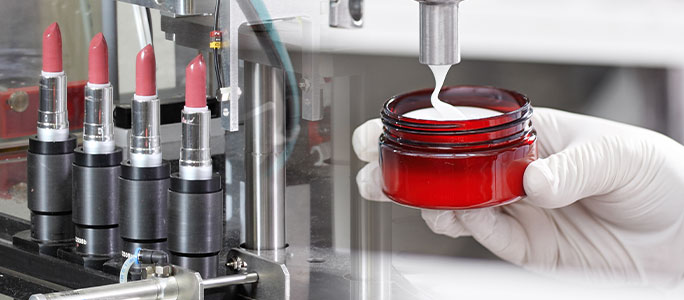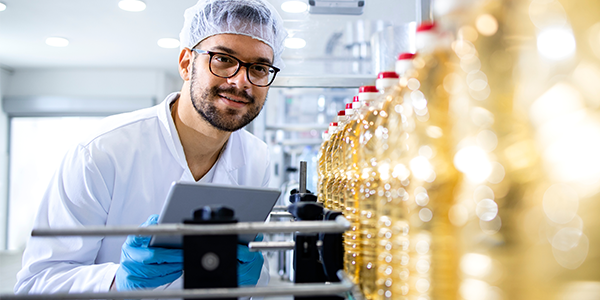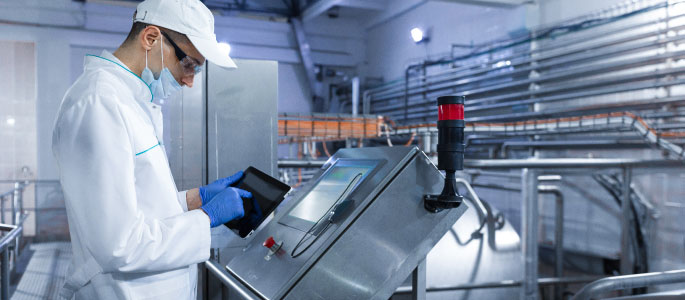
We tend to visualize our favorite dishes when we think about food. Food, be it salads, pizza, burgers, ice cream, cool beverages, or chicken tacos, should satiate not just our taste buds but quality expectations too. These expectations put immense pressure on the food manufacturers to continually innovate better, safer and quality food products.
However, meeting these expectations through manual and spread sheet based methods can be incompetent. Food manufacturing businesses need a solution that can nourish and support their whole business processes and simplify them all to improve efficiency and agility. Talking specifically of the United Kingdom, the scope of the food production industry is very vast and multi-faceted because it includes a variety of sub-verticals, including those for fresh produce, beverages, frozen meals, canned foods, etc.
So, what’s the apt solution to manage such a diverse industry in the UK or any other global country?
Well, it’s a food manufacturing ERP software!!
Read the rest of the blog to learn how this tool is a proven solution in growing the revenue and profits of food businesses:
Overview:
ERPs have been around for decades now but, today’s food companies need cutting-edge technology to grow at a rate the industry demands. ERP systems are now considered as a standard in the corporation for obtaining the adaptability and insightful data to flourish. The needs of these businesses are peculiar, and there are many variations within the food sector, for example, meat producers need a function for cutting calculations, dairies profit from integrated milk payment statements, and huge bakeries place a premium on storage management.
So, without further ado, let’s know –
What is Food ERP software?
Food ERP software is a food-oriented business management tool that helps integrate and automate the functioning of core supply chain processes like, manufacturing, finance, raw material procurement, sales, etc. and establish a cohesive workflow. Moreover, it also ensures a continuous flow of real-time information across all the departments to empower data-driven decisions for improved functioning.
Food and beverage manufacturing ERP incorporates automation into the manufacturing unit and provides a centralized database enabling quick storage and access to the stored data anytime, anywhere. This establishes a single and accurate source of information within the organization, and also for the ones operating remotely.
Post Covid, it was challenging for the food manufacturers of the United Kingdom to streamline and automate their business process while retaining the necessary level of customer connection. Not just in the UK, manufacturers worldwide, are currently battling to deal with the pandemic’s repercussions, transform the food sector for the better, and plan in advance for crises like these.
Who can benefit from Food ERP software?
Food ERP is now micro-verticalized for all its sub-industries such as fresh produce, meat, fish, dairy, bakery, confectionery, sauces and dressings, spices and ingredients, frozen and prepared packaged meals, beverages, et al. And, Food ERP systems are ideal for businesses of all sizes.
Whether it is a developing SME or a midmarket firm with hundreds of employees or a large MNC, it will without a doubt help them in achieving their strategic goals (provided the selection is right). Add to the mix today’s dynamic environment and peculiar customer demand. The health-conscious customer now indulges in the conscious consumption of processed foods, instead savors food that has higher nutritional value. Businesses, big or small, can take this as an opportunity to re-align their products with consumers’ health-conscious philosophy and create products as per this rising need. And, an ERP can be a best bet to achieve this.
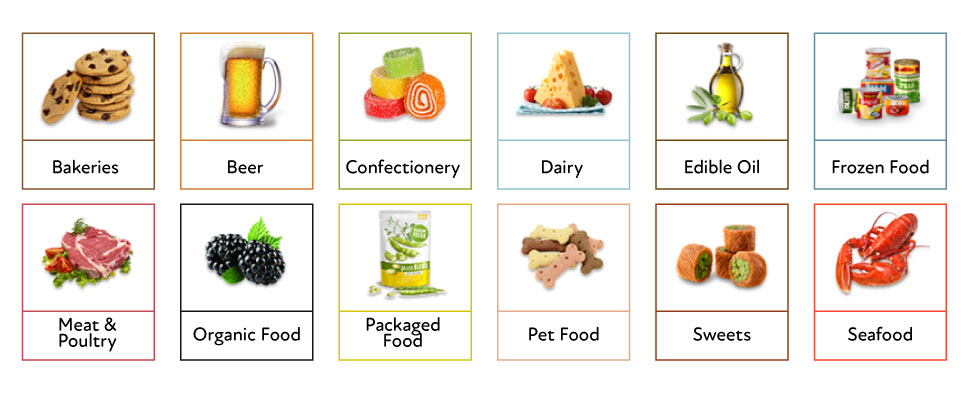
Why is it needed?
Like the industry itself, the manufacturing of food and beverages faces a variety of complex challenges. Given its size and extensive micro-vertical range, it is one of the process manufacturing industry’s major sector (as stated above).
Food manufacturers face numerous difficulties every day as they try to accelerate their growth through the development of new food products, increasing production, and optimizing expenses. There is just one place to invest when it comes to managing these concerns and accelerating business enhancements, and that is food manufacturing ERP software.
For eg, the bakery industry: Operates on wafer-thin margins and faces procurement challenges almost on a daily basis. Then there are challenges related to demand forecasting, cost monitoring, food quality, supply chain alignment, etc.
Or take the seafood or fish industry, which grapples with challenges such as traceability, daily prognosis, slicing efficiency, food quality, safety, etc. Even for the dairy industry or meat & poultry industry, the challenges remain unique, like inventory management and planning, reducing scrap percentage, dealing with varying lot potency and catchweight, managing Co & by-products, animal welfare & sustainability etc.
And the same goes for packaged food, where continuous innovation, proper labelling, food quality control & safety, managing various end products and intermediates, short ordering cycles, are concerns of paramount importance.
Other challenges also include shifting consumer preference for natural and healthy products, the need for constant innovation and sustainable manufacturing, stiff competition, and strict regulatory requirements, among others.
Comes to the rescue a food ERP software that can efficiently handle all these issues through its hosts of capabilities like formulation and R&D to bring in innovation, streamlined supply chain to reduce time to market, simplified production to produce products that are affordable, and Quality Control to satisfy the customers by providing high-quality items that match their expectations.
Taste success by blending your food operations with a Food ERP software
ERP software for food manufacturing not just smoothens a food manufacturer’s routine manufacturing operations, but also provides a systematic streamlined approach to managing the entire supply chain operations from procuring the food items, to manage them, creating batches for production, checking the qualities, packaging them and finally dispatching them till it reaches the end user.
Following benefits a food industry can avail if they implement food ERP software:
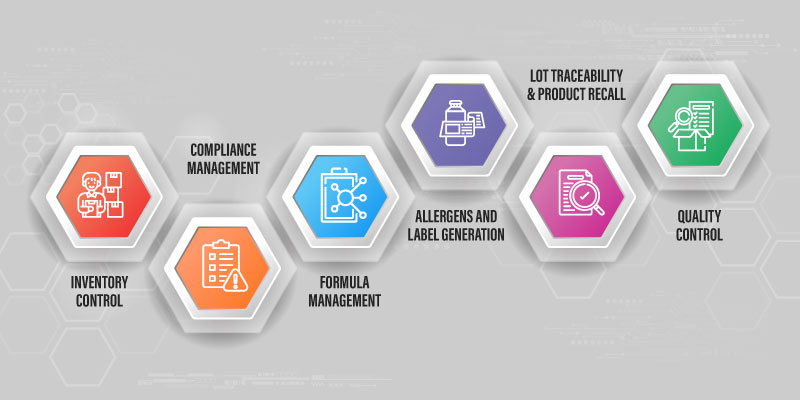
Inventory control
Proper inventory management is essential for a sector like food and beverages because a large amount of the inventory is perishable. An ERP provides waste-reduction techniques including expiry and shelf-life management, attribute-based inventory classification and storage, first expired, first out (FEFO) lot issuing procedures, FIFO, and others.
Reorder points, reminders, and preferred vendors are some of its features that prevent unexpected stock-outs. Additionally, it constantly updates the inventory status to keep you informed of the available-to-promise stock in real-time whenever a transaction is made or raw materials are issued to production. It also minimizes inventory loss by notifying about the soon-to-expire products and saves high on overhead costs too.
Compliance Ready
Food manufacturers have long been worried about complying with regulatory norms. However, an ERP makes it simple to achieve the necessary quality and safety requirements imposed by food regulatory organizations like the FDA, FSSAI, etc.
The visibility, security, and traceability of the food manufacturing operations from inventory receipt to delivery are improved by a food ERP. As a result, the regular manufacturing procedures flawlessly follow cGMP criteria. It helps avoid legal problems and penalties with its audit trails, master batch records, label generation, allergy classification, etc.
Formula management
For food producers, handling recipes or formulas is as important as breathing air. And so, it is essential that these recipes are stored, managed, and secured accurately.
The automated recipe control module in ERP for food is a technology at the enterprise level that enables manufacturers to create and store recipes as well as track modifications made to them. Additionally, food ERP can link with widely used databases like Genesis, USDA, and others, giving producers the ability to conduct R&D and easily achieve the desired nutritional values. Its features, such as audit trails and role-based access, safeguard the formulas from alteration and unauthorized access.
Allergens and label generation:
In order to satisfy customers’ concerns about food safety, food manufacturers must pay attention to the components, particularly those that can cause allergies. Every step of the manufacturing of such products, starting with storage, must be monitored in order to completely eradicate any risk.
Another requirement for food makers is the proper labeling of allergens, ingredients, and nutritional information in accordance with FDA regulations. This issue may easily be remedied by utilizing a software that enables the generation of labels in all FDA-specified formats.
Lot Traceability & Product Recall
The concern over food quality has increased because of the rising number of food incidences. Maintaining the brand of your company in such scenarios depend on your ability to provide high-quality products.
For this, one of the key requirements of businesses is enabling “Full Traceability” during the manufacturing process. An ERP software’s traceability capability evaluates the overall business system to quickly identify existing non-conformities and, if needed, implements corrective action and preventive action (CAPA) over them. Additionally, the ERP for the food industry instantly recognizes, notifies, and manages the entire recall procedure in just a few clicks.
Quality control-
Customers will ultimately eat your product, therefore it’s imperative that you give them a high-quality item that also ensures their safety and protects their health. The quality assurance feature of food ERP software can help you set up tests and processes to measure the quality of goods. Its bi-directional traceability feature performs thorough checks while procuring, utilizing, producing, and finishing a batch of products.
In addition, the QC module alerts straight away to any non-conformity or contamination and handles the product recall fast to reduce risk and loss.
But wait, there’s more… Not all food businesses are the same…
Micro-vertical strategy is essential!!!
Food manufacturing software streamlines all the routine tasks of food manufacturers and also, supports co-product and by-product management, batch scalability, reverse bill of materials (BOM), and flexible and dynamic packaging options, among other things.
But, in our opinion instead of choosing a generic ERP, they should first identify the top-suited food and beverage ERP software for their processes, map it with ERP software and then deploy it. For an instance, meat and poultry, edible oils, dairy, and bakeries are all involved in the food and beverage industry, but their processes aren’t the same.
They require a particular software program that targets their “micro-verticals.” A specialized system that can map their business processes and then manage the supply chain accordingly.
Summarizing thoughts
So, whether you’re spinning pizza dough in pizzerias, mixing chocolate chips with cookie dough at bakeries or crafting the perfect pastrami on rye in delis, food ERP software has the capabilities to streamline these food manufacturing operations, integrate people, and process and collaborate with all the latest technology trends.
We at BatchMaster have been successfully serving the process manufacturing industries for more than 30 years, our strategy of specializing in “micro verticals” sets us apart from other software vendors. We serve industries such as seafood, bakeries, meat and poultry, dairy, packaged foods, organic foods, fresh produce, chocolates, sweets, candy and confectionery, edible oils, beer, etc.
So, if you are into the above-mentioned food manufacturing business or any other process manufacturing business, we have exactly what you need. Visit our website, or write to us directly for more information about our software products.




